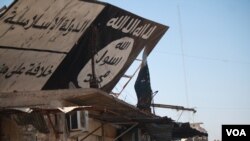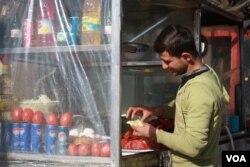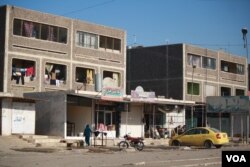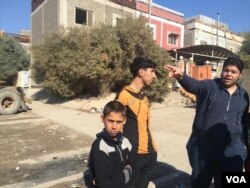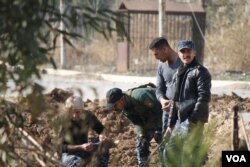“We were under mortar fire for a month and a half,” says Nabil, who makes tea at a cafe in the sprawling urban residential complex in eastern Mosul known as The Apartments. “So many people were injured and killed. So many people are buried in our gardens.”
And while mortars still fall in parts of Iraqi-controlled Mosul, The Apartments are now quiet and far from the front lines. But soldiers say as they prepare to begin fighting in western Mosul in the coming days, the carnage in the complex late last year may portend a tough battle ahead.
Like The Apartments, much of western Mosul has tightly-packed communities with narrow, zigzagging roads where militants fight from inside and on top of residents’ homes.
Iraqi forces had to enter The Apartments on foot while sniper fire rained down from the rooftops because the roads were too narrow for Humvees, according to Special Operations Forces 1st Lt. Ali Sahaf, one of the fighters in the operation on the ground.
“We had to surround the area before we could begin, and then it took roughly a week,” he explained. “It was similar to liberating a city starting from zero.”
Militants’ flights
Other parts of Mosul fell faster, says Sahaf, as militants often ran away when Iraqi tanks rolled in. IS sent back mortars, car bombs and armed drones, but only very rarely moved any direction but back. The strongest and best-trained militants already had fled in advance of Iraqi forces’ attacks, according to soldiers and residents.
Many of those fighters are believed to be hiding out west of the Tigris River, in the heart of what has been the Islamic State's de-facto Iraqi “capital” for the past two-and-a-half years.
“Only the young, local militants stayed in this area,” said Mohammad Ayad, an 18-year-old sandwich maker at the cafe in The Apartments. “The foreign fighters and the Emirs all left when they heard Iraqi forces were coming.”
As fighters departed, however, families remained. IS militants threatened to kill anyone who left as they rounded up former police officers and imposed even harsher punishments in the last few months of their rule.
“A month before the liberation, IS stoned a girl at the end of this road,” said Ayad, pointing to a square of shops and a garbage pile down the street. “They said she had unmarried [pre-marital] sex, but we didn’t believe it.”
The girl was pelted with rocks until she passed out. The stoning continued until she woke up and tried to flee. IS militants then declared her sentence served, handcuffed her and brought her home, severely injured, Ayad explains.
“They put checkpoints up everywhere,” he added. “They were looking for mobile phones, and checking to make sure men had beards. They whipped you if you had cigarettes in your pocket.”
Consolidating human shields
Terrorized into obedience and surrounded by IS-held areas outside the city, residential areas of western Mosul are expected to be even more densely populated than The Apartments, one of the most crowded areas in the eastern part of the city.
"We cannot randomly mortar the other side because there are so many families," said Colonel Salah Mehdi, gazing out from a roof-top sniper-post overlooking the river. "There are thousands of fighters over there, and they hardly ever surrender. They run away or die."
If or when IS moves its frontlines back in the coming battles, civilians also are expected to move with them, making the fighting more treacherous as it drags on. IS militants have consistently forced families to move back with them in the east to serve as human shields. And as militants get boxed into smaller areas, so do the families.
“My sister is waiting for Iraqi forces to get closer to her so she can try to run,” said Mohammad, a 30-year-old day laborer at a refugee camp outside Mosul. “But she cannot call me often. She has no electricity to charge her phone, and if militants found out she has a mobile phone, they would chop her head off.”




